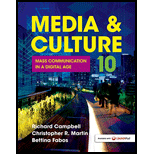Course & Student Learning Outcomes & Objectives
Global Learning Course and Student Learning Outcomes and Objectives
Global Awareness:
Global Learning Student Learning Outcome Addressed:
Students will be able to discuss prevailing world conditions associated with local, global, international, and intercultural issues, trends, and systems.
Course Learning Outcome:
Students will be able to demonstrate knowledge of international media characteristics as they manifest in various globalized content and localized content.
Global Engagement:
Global Learning Outcome Addressed:
Students will be able to demonstrate engagement in local, international, intercultural, and global problem solving.
Course Learning Outcome:
Students will be able to demonstrate engagement in responding to a global issue presented from different perspectives in media from various parts of the world.
Global Perspective:
Global Learning Student Learning Outcome Addressed:
Students will be able to detect the distinctive and common qualities between their own perspective and the perspectives of others.
Course Learning Outcome:
The course will analyze basic media and communication elements found in all or most international media formats and products.
Course Modules Learning Outcomes & Objectives
(Module 1): Course Objective
Foundations of Global Mass Media and Print Media.
Global Awareness:
Global Course Learning Outcome Addressed:
Students will be able to demonstrate knowledge of international media characteristics as they manifest in various globalized content and localized content related to print media.
Global Perspective:
Global Course Learning Outcome Addressed:
The course will analyze basic media and communication elements found in all or most international print media formats and products.
(Module 2):
Course Objective
Understanding the Relationship and Origins of Media & Pop Culture and the Origins of Media Broadcasting
Global Awareness:
Global Course Learning Outcome Addressed:
Students will be able to demonstrate knowledge of international media characteristics as they manifest in various globalized content and localized content related to pop culture.
Global Perspective:
Global Course Learning Outcome Addressed:
The course will analyze basic media and communication elements found in all or most international audio media formats and products.
(Module 3)
Course Objective
Understanding Media Storytelling and Media as Culture
Global Awareness:
Global Course Learning Outcome Addressed:
Students will be able to demonstrate knowledge of international media characteristics as they manifest in various globalized content and localized content related to media storytelling.
Global Perspective:
Global Course Learning Outcome Addressed:
The course will analyze basic media and communication elements found in all or most international audio visual media formats and products.
(Module 4):
Course Objective
Defining Consumer Media Culture & Media Propaganda
Global Awareness:
Global Course Learning Outcome Addressed:
Students will be able to demonstrate knowledge of international media characteristics as they manifest in various globalized content and localized content manifesting propaganda, public relations, advertising, and branding techniques.
Global Perspective:
Global Course Learning Outcome Addressed:
The course will analyze basic media and communication elements found in all or most international media formats and products manifesting propaganda, public relations, advertising, and branding techniques.
(Module 5):
Course Objective
Understanding the Conflict of Self Expression & Information Control
Global Awareness:
Global Course Learning Outcome Addressed:
Students will be able to demonstrate knowledge of international media characteristics as they manifest in various globalized content and localized content manifesting the culture of journalism
Global Perspective:
Global Course Learning Outcome Addressed:
The course will analyze basic media and communication elements found in all or most international media formats and products manifesting the culture of journalism
(Module 6):
Course Objective
Defining Stereotyping, Cultural Identity & Globalization in Media
Global Awareness:
Global Course Learning Outcome Addressed:
Students will be able to demonstrate knowledge of international media characteristics as they manifest in various globalized content and localized content manifesting the conflicts and existence of cultural diversity and stereotyping
Global Perspective:
Global Course Learning Outcome Addressed:
The course will analyze basic media and communication elements found in all or most international media formats and products manifesting the conflicts and existence of cultural diversity and stereotyping
(Module 7):
Course Objective
Presentation of Semester Projects
Global Engagement:
Global Course Learning Outcome Addressed:
Students will be able to demonstrate engagement in responding to a global issue presented from different perspectives in media from various parts of the world.
Grade Structure:
Academic Honesty
As FIU students, you are expected to
strictly follow the honor code regarding academic honesty. Florida International
University outlines your responsibilities as follows:
Florida International University is a
community dedicated to generating and imparting knowledge through excellent
teaching and research, the rigorous and respectful exchange of ideas and
community service. All students should respect the right of others to have an
equitable opportunity to learn and honestly to demonstrate the quality of their
learning. Therefore, all students are expected to adhere to a standard of
academic conduct, which demonstrates respect for themselves, their fellow
students, and the educational mission of the University. All students are deemed
by the University to understand that if they are found responsible for academic
misconduct, they will be subject to the Academic Misconduct procedures and
sanctions, as outlined in the Student Handbook.
Misconduct includes: Cheating – The
unauthorized use of books, notes, aids, electronic sources; or assistance from
another person with respect to examinations, course assignments, field service
reports, class recitations; or the unauthorized possession of examination papers
or course materials, whether originally authorized or not. Plagiarism – The use
and appropriation of another’s work without any indication of the source and the
representation of such work as the student’s own. Any student who fails to give
credit for ideas, expressions or materials taken from another source, including
internet sources, is responsible for plagiarism.
Any students who fail to meet these
expectations will receive an “F” for the course grade and will be reported to
the Chair of the Department, as well as the Dean of the School.

